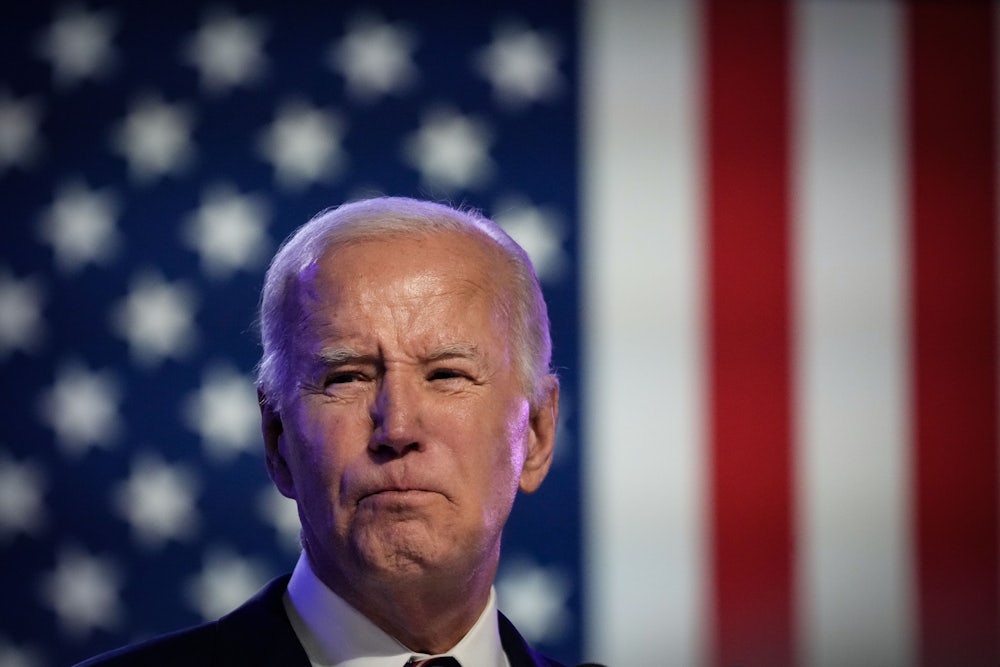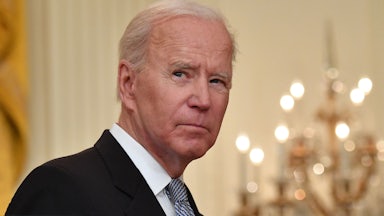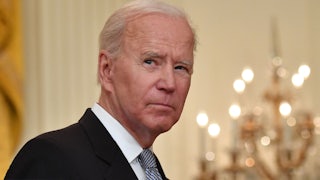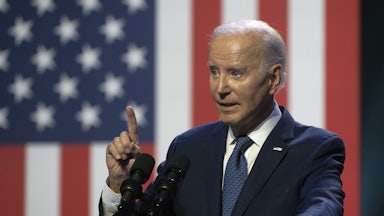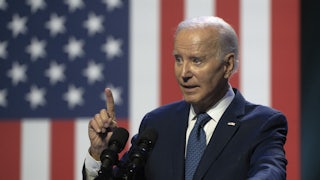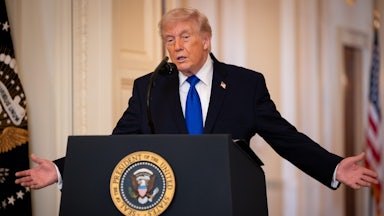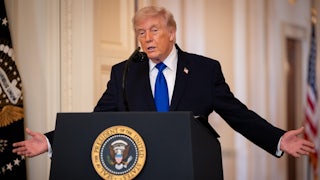Joe Biden wants the 2024 presidential election to be a referendum on the future of American democracy. It’s not hard to see why. There is an existential threat embedded in this contest, as the likely Republican nominee is someone who has already tried to subvert American democracy once and who has spent the last several years campaigning on finishing the job he started on January 6, 2021.
But there’s a second dynamic in play for Biden as well. A laser focus on democracy is a clean way to get around the very real headwinds that have caused Biden’s poll numbers to plummet, namely around his advanced age and the somewhat halting way he has delivered a promised return to normalcy. Voters may long for someone better than Biden—and, based on polling from the last two years, they clearly crave some fresh blood, even if that merely means “generic Democrat” at the moment. Still, those concerns should pale next to the threat posed by Trump (who, for what it’s worth, voters also do not like at all).
Elections are about contrasts, and on Friday Biden officially launched his 2024 campaign by laying out a stark one: Donald Trump is hell-bent on destroying American democracy; Joe Biden, like him or not, is there to protect it.
“When the attacks of January 6 happened, there was no doubt about the truth. At the time, even Republican members of Congress and Fox News commentators publicly and privately condemned the attack. And as one Republican senator said, Trump’s behavior was embarrassing and humiliating for the country,” Biden said. “But now as time has gone on, politics, fear, money have all intervened, and those MAGA voices who know the truth about Trump and January 6 have abandoned the truth and abandoned our democracy. They’ve made their choice. Now the rest of us—Democrats, independents, mainstream Republicans—we have to make our choice. I know mine, and I believe I know America’s.”
It was a strong, impassioned speech. It was also the exact rhetoric The New Republic’s editor, Michael Tomasky, argued that Biden should be using, again and again, until November—the idea being that a larger plan to foreground the threat posed by the former president “will have [voters] terrified at the prospect of Trump getting back into the White House.” Making the case that Trump is a risk not worth taking the primary focus of a campaign has a mixed record of success—it worked in 2020, as well as the 2022 midterms; it failed notably in 2016. Still, why not take your shot? As campaign arguments go, it has the advantage of being both politically salient and, best of all, true.
But while Trump will certainly spend most of the next 10 months—whether or not he is the Republican presidential nominee, which he almost certainly will be—saying inflammatory and fascistic things, I worry that this argument won’t be enough on its own to sustain Biden’s bid. He is currently in need of a positive and proactive argument as well. If Biden is going to assert that democracy must be saved—and that, by extension, he is its savior—he needs to make the case that he is a worthy and capable protector of it. Thus far, he hasn’t explicitly filled in these blanks. Moreover, the pro-democracy message does nothing to address Biden’s biggest vulnerability: that he may not be not up to the task of being president for four more years.
It’s worth remembering that Biden’s core argument in 2020 wasn’t simply that he was a saner and more stable figure than Donald Trump: It was that he could restore a sense of competence and stability to a government that had been rattled by years of turbulence. The Covid-19 pandemic has receded as a political issue—just ask Ron DeSantis—but its prominence was central to Biden’s pitch to voters. In 2020, he successfully argued that Trump’s chaotic approach to governance was making an already devastating pandemic worse and that he could bring back a sense of normalcy. Above all else, however, Biden’s 2020 candidacy was built around a simple pitch: He alone could make America boring again after several years rocked by constant chaos, nonstop tweeting, and a once-in-a-century pandemic. It was a choice between the crazy spectacle of a bull rampaging through a china shop and—well … just the china shop.
It was a good pitch! More importantly, it was one that made Biden’s greatest liability—he became the oldest president-elect ever—into an asset. Biden had experience and, despite his penchant for gaffes, enough gravitas to make the case that he was a steady, trusted hand. Voters were ready for a break from tweet barrages at every hour of the day and night and ready to settle for a duller, more predictable candidate. No, Biden wasn’t going to be an exciting, electrifying president, but he might be one that you didn’t have to think about several times a day.
Biden has, in many ways, kept that promise. His administration has produced a bevy of old school legislative accomplishments built around infrastructure spending that make him arguably the most accomplished Democratic president since Lyndon B. Johnson. Amid a series of unforeseen geopolitical crises, his administration’s response has been—for better and, more recently, for worse—to double down on existing alliances. There have been no actual political scandals to speak of (though there have been several manufactured ones), a noted contrast to the previous four years.
But Biden’s image as a steady, competent figure has been damaged, perhaps irrevocably. His poll numbers began to dip after the first geopolitical crisis, the fallout from the disastrous pullout from Afghanistan. Perceptions of Biden’s age—he is both the oldest president in American history and has had several physical and verbal stumbles in recent years—have only made the issue worse. He has not been aided by factors outside of his control: He could hardly be blamed for Russia’s invasion of Ukraine or Hamas’s attack on Israel on October 7, both of which have understandably given the impression of a world on the brink of chaos. Chaos within the Republican Party as well as its efforts to generate pseudo-scandals have, moreover, damaged Biden’s ability to sell himself as someone who can transcend partisan rancor.
Biden’s troubles recall those that beset Barack Obama during his first term, when Republican obstruction and intransigence dinged his image as an agent of hope, change, and political renewal. But Obama could rely on youth and vigor to aid his response. Biden lacks these reservoirs of political potency, but he can still look to Obama’s successful reelection campaign as a roadmap: His former boss combined attacks on Mitt Romney’s plutocratic domestic program with a robust defense of his first term, to handily win despite an underperforming economy, as inspiration. For now, impassioned calls to protect democracy are a fine opening argument. But his campaign needs to acknowledge the growing concern over the president’s competence and reassure voters that his well-meaning intentions will be matched by a truly strong and stable grip on the rudder of our Republic that people can believe in.
